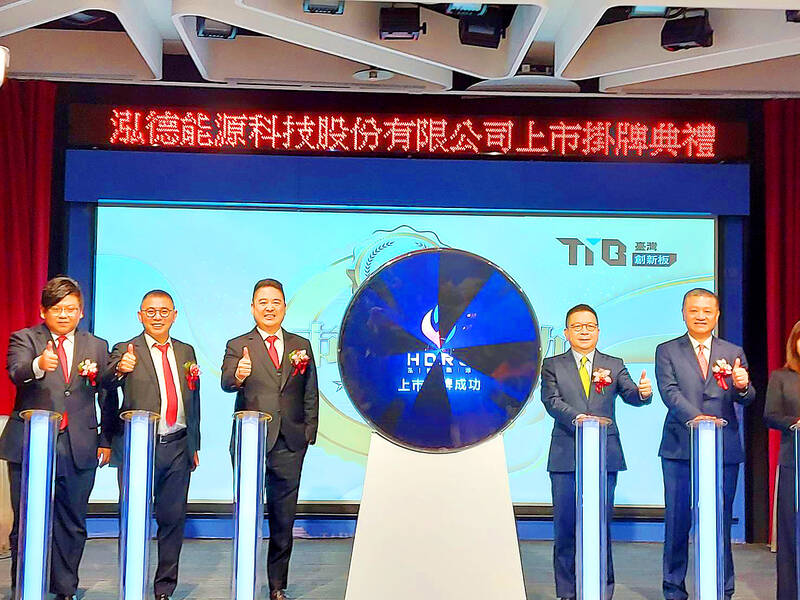HD Renewable Energy Co Ltd (泓德能源), which on Monday debuted its shares on the Taiwan Innovation Board (TIB), aims to secure long-term growth by investing in solar power, developing charging systems and expanding its trading of renewable energy, it said.
“It is our goal to become a smart electricity company, to make renewable energy more available and accessible for the public,” HD Renewable chairman Hsieh Yuan-yi (謝源一) told a news conference at the Taiwan Stock Exchange (TWSE).
The company, with paid-in capital of NT$850 million (US$27.78 million), focuses on the construction of solar power facilities, the trading of renewable energy and the development of storage systems for renewable energy.

Photo: Chen Yung-chi, Taipei Times
HD Renewable has worked with several life insurance companies to invest in and develop solar power with a total capacity of more than 100 megawatts, the company said.
Last year, the firm helped suppliers of solar power sell electricity to domestic buyers, including small and medium-sized companies, and partnered with Taiwan FamilyMart Co (全家便利商店) to provide charging services for electric scooters, Hsieh said.
Revenue from the solar power plant business — through which it offers engineering procurement and construction services — made up more than 90 percent of its revenue over the past two years, its prospectus filed with the Taiwan Stock Exchange showed.
The company also obtained revenue from maintenance services and power trades. It sells electricity through its subsidiaries Star-renewables Corp (星星電力) and Star Charger (星舟快充), the prospectus showed.
This year, the company is to focus on a fishery-and-electricity symbiosis project, in which solar panels are installed over fish ponds, as a way to expand solar capacity despite land availability issues and tight regulations, it said in the prospectus.
In the long term, the company would concentrate on renewable energy trades to meet rising demand to lower carbon emissions among local firms, it added.
HD Renewable reported record revenue of NT$5.06 billion for last year, up 88 percent from a year earlier, with net profit of NT$650 million, or earnings per share of NT$8.18, the highest since its establishment in 2016.
HD Renewable became the first company to list on the Taiwan Innovation Board this year and the second after micro-LED supplier PlayNitride Inc (錼創科技), which started trading its shares on the new board in August last year.
The Taiwan Stock Exchange launched the TIB for start-ups in July 2021. Several companies in the electric scooter, renewable electricity, biotech and cloud technology businesses are planning to submit their applications for listing on the board later this year, Taiwan Stock Exchange chairman Sherman Lin (林修銘) said on Monday
The exchange aims to seek 10 applicants for the new trading board this year and more than 10 next year, Lin added.

Merida Industry Co (美利達) has seen signs of recovery in the US and European markets this year, as customers are gradually depleting their inventories, the bicycle maker told shareholders yesterday. Given robust growth in new orders at its Taiwanese factory, coupled with its subsidiaries’ improving performance, Merida said it remains confident about the bicycle market’s prospects and expects steady growth in its core business this year. CAUTION ON CHINA However, the company must handle the Chinese market with great caution, as sales of road bikes there have declined significantly, affecting its revenue and profitability, Merida said in a statement, adding that it would

Greek tourism student Katerina quit within a month of starting work at a five-star hotel in Halkidiki, one of the country’s top destinations, because she said conditions were so dire. Beyond the bad pay, the 22-year-old said that her working and living conditions were “miserable and unacceptable.” Millions holiday in Greece every year, but its vital tourism industry is finding it harder and harder to recruit Greeks to look after them. “I was asked to work in any department of the hotel where there was a need, from service to cleaning,” said Katerina, a tourism and marketing student, who would

i Gasoline and diesel prices at fuel stations are this week to rise NT$0.1 per liter, as tensions in the Middle East pushed crude oil prices higher last week, CPC Corp, Taiwan (台灣中油) and Formosa Petrochemical Corp (台塑石化) said yesterday. International crude oil prices last week rose for the third consecutive week due to an escalating conflict between Israel and Iran, as the market is concerned that the situation in the Middle East might affect crude oil supply, CPC and Formosa said in separate statements. Front-month Brent crude oil futures — the international oil benchmark — rose 3.75 percent to settle at US$77.01

RISING: Strong exports, and life insurance companies’ efforts to manage currency risks indicates the NT dollar would eventually pass the 29 level, an expert said The New Taiwan dollar yesterday rallied to its strongest in three years amid inflows to the nation’s stock market and broad-based weakness in the US dollar. Exporter sales of the US currency and a repatriation of funds from local asset managers also played a role, said two traders, who asked not to be identified as they were not authorized to speak publicly. State-owned banks were seen buying the greenback yesterday, but only at a moderate scale, the traders said. The local currency gained 0.77 percent, outperforming almost all of its Asian peers, to close at NT$29.165 per US dollar in Taipei trading yesterday. The